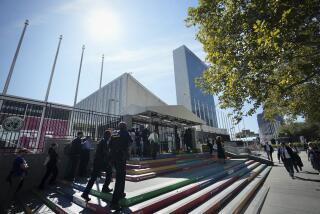U.N.’s Needed Role in Iraq
- Share via
The United Nations is taking steps to restore a role for itself in Iraq, and the United States should offer both strong encouragement and firm promises of protection. U.N. Secretary-General Kofi Annan’s announcement Tuesday that he will send a team to Iraq to broker interim elections could bolster U.S. chances of meeting a self-imposed June 30 deadline to hand over political and economic power to Iraqis.
Annan opposed the U.S. invasion and was shaken by the August bombing by insurgents that killed the top U.N. official in Baghdad, Sergio Vieira de Mello, and many others. But after meeting with President Bush this week he said a U.N. team would help “establish a government that is Iraqi.” Annan’s agreement followed pleas from many world leaders, including Bush, who previously was cool to offering the U.N. much authority.
Iraq’s most prominent cleric, Grand Ayatollah Ali Sistani, is the main stumbling block to the U.S. plan to form local caucuses that would pick a national assembly. The assembly, in turn, would write a constitution and plan direct elections for next year. Sistani has demanded direct elections right away, but U.S. occupation authorities say there is not time or security for direct balloting. Annan may be able to end this deadlock.
Sistani has not supported an Iranian-style theocracy, but he wants a major role for his fellow Shiite Muslims. Shiites account for about 60% of the population but were shut out of power when Iraq was formed from pieces of the Ottoman Empire after World War I. Saddam Hussein persecuted Shiites mercilessly. Sistani has told aides he is willing to accept the U.N. determination on what kind of elections can be held and when.
Iraqi guerrillas continue to kill U.S. soldiers almost daily, and the death toll among Americans is more than 520 -- about 360 of them in combat. Returning political control to Iraqis should reduce anger at the occupation, even though more than 100,000 U.S. troops are expected to remain.
In November the U.S. picked June 30 for transferring sovereignty after Iraqi leaders complained Washington was moving too slowly. The date should not be set in stone. Handing over authority is desirable, but the U.S. must guard against leaving behind chaos. Even though reducing the U.S. target in Iraq is a political goal in a presidential election year, an Iraq trapped in ethnic fighting would be politically worse than delay.
Annan is understandably leery of being perceived as doing Washington’s bidding. The U.N., in consultation with Iraqis, must decide when elections are held and how to carry them out. There is gain for the United States in deferring to Annan, in that nations angered by the U.S. invasion may be more willing to provide money and personnel for reconstruction under the umbrella of Iraqi control backed by U.N. legitimacy.
More to Read
Sign up for Essential California
The most important California stories and recommendations in your inbox every morning.
You may occasionally receive promotional content from the Los Angeles Times.












